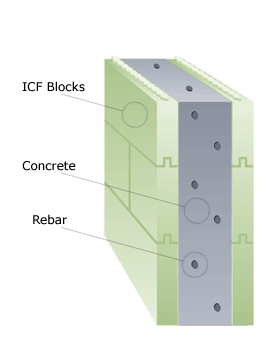|
|
What are Insulated Concrete Forms (ICFs)?
Insulated Concrete Forms, ICFs, are permanent concrete forming systems constructed of material with low heat conductivity (high R-value), usually expanded polystyrene (EPS) foam, commonly called Styrofoam. An ICF serves the functions of concrete form, insulation, and furring for drywall and siding all in one material. ICF’s offer all of the structural benefits of solid concrete walls, which is especially important when attempting to build a hurricane proof home in central Florida, as well as one of the highest efficiency and construction turn-around ratings of any building method currently available. The insulated concrete form industry is one of the fastest growing fields in the building trades.
A common ICF system:
In almost all cases ICFs consist of hollow, interlocking foam blocks that are stacked together much like traditional concrete block with out the mortar. Horizontal reinforcement bar is typically clipped in to a plastic hanger while the foam is being “stacked”; greatly reducing the time spent tying rebar in the construction of traditional concrete homes.
The completed foam structure is filled with concrete in the same manner as traditionally patented forming systems. Unlike traditional forming systems, an insulated concrete form remains in place after the concrete is set. Once again, reducing the time traditionally spent stripping forms. Horizontal reinforcement bar is typically clipped in to a plastic hanger while the foam is being “stacked”; greatly reducing the time spent tying rebar in the construction of traditional concrete homes.
The completed foam structure is filled with concrete in the same manner as traditionally patented forming systems. Unlike traditional forming systems, an insulated concrete form remains in place after the concrete is set. Once again, reducing the time traditionally spent stripping forms.
A Common ICF block:
Most blocks consist of two EPS foam panels connected by rigid plastic webs. The foam panels serve as the concrete form, and as insulation. The plastic webs serve three separate functions. They are the wall ties, enabling the ICF to hold concrete at a constant wall thickness. They will hold the horizontal rebar in place, and plastic slats on the ends of the webs near the outside face of the form will act as furring that can be fastened to just like a traditional wood framed home.
Benefits of ICF’s over traditional construction:
When considering the benefits of ICFs for the construction of homes in Central Florida, you must first consider the benefits of solid concrete walls over wood framed and block walls. Concrete walls are by far the most structurally sound walls available, and the closest thing to a hurricane proof home available. Wood framed homes are connected with mechanical fasteners, and concrete block is split by mortar joints. Over time the fasteners and mortar joints can fail, compromising the structural integrity of the home. Concrete is the only material that creates a solid monolithic structure, with no connections that can fail over time. ICF walls are solid concrete walls that combine insulating and finish framing into the forming process. ICFs are an inexpensive means of constructing the strongest, most energy efficient home available at any cost.
|
ICF Facts
Energy efficiency
One of the many benefits of insulated concrete form construction is superior insulation performance and the resulting conservation of energy.
Green Product
ICFs have been certified as “green” products by almost all U.S. organizations attempting to regulate environmentally friendly design.
A stronger home
PATH partners are finding that poured concrete homes resist wind loads better than concrete block homes, with the additional benefits that poured concrete homes are faster to construct, require less onerous inspections, and provide a more easily installed, uninterrupted, thermal barrier of insulation.
Sound Barrier
Insulated Concrete Forms provide exceptional sound attenuation.
ICF structures achieve documented levels of Sound Transmission Classifications (STC) 50 (inaudible) or higher. Wood frame structures typically rate an average of STC 25, meaning that voices can be heard outside the structure.
Consolidation of trades:
One ICF installation crew provides the services of masons, framing carpenters, and insulators combined. This 3-in-1 construction process simplifies project management and can reduce costly down time.
Benefits of Insulated Concrete Forms
ICFs are, quite simply, a superior construction method.
They provide:
- Significant energy savings
- Superior acoustical insulation (low noise infiltration)
- Reduces or eliminates mold proliferation
- Compatible with any seismic or hurricane/storm standard.
- Superior fire protection
Savings of 50 – 80% can be achieved when ICFs are used as part of a system with other energy efficient components like windows and high performance insulation like spray foam insulation and these savings continue for the life of the building. They are one of the lowest maintenance materials available, and are strong enough to withstand some of the heaviest storms. ICFs also provide superior fire protection with an over four hour fire rating. Its no wonder many insurance companies offer significant discounts to the owners of homes built with ICF blocks.
|
|
|







 Horizontal reinforcement bar is typically clipped in to a plastic hanger while the foam is being “stacked”; greatly reducing the time spent tying rebar in the construction of traditional concrete homes.
The completed foam structure is filled with concrete in the same manner as traditionally patented forming systems. Unlike traditional forming systems, an insulated concrete form remains in place after the concrete is set. Once again, reducing the time traditionally spent stripping forms.
Horizontal reinforcement bar is typically clipped in to a plastic hanger while the foam is being “stacked”; greatly reducing the time spent tying rebar in the construction of traditional concrete homes.
The completed foam structure is filled with concrete in the same manner as traditionally patented forming systems. Unlike traditional forming systems, an insulated concrete form remains in place after the concrete is set. Once again, reducing the time traditionally spent stripping forms.